Looking after Baby and Toddler Teeth
Looking after Baby and Toddler Teeth- What’s the Advice on Visiting the Dentist?
- It’s important for parents to take their baby to visit the dentist as soon their first tooth comes through. All children should visit the dentist by their 1st Birthday (#DCby1)
- Parents can find their local dentist with this useful NHS Dentist finder (opens in new tab)
- Plan regular visits to the dentist and have a routine check up every 6 months (or as advised by your dentist)
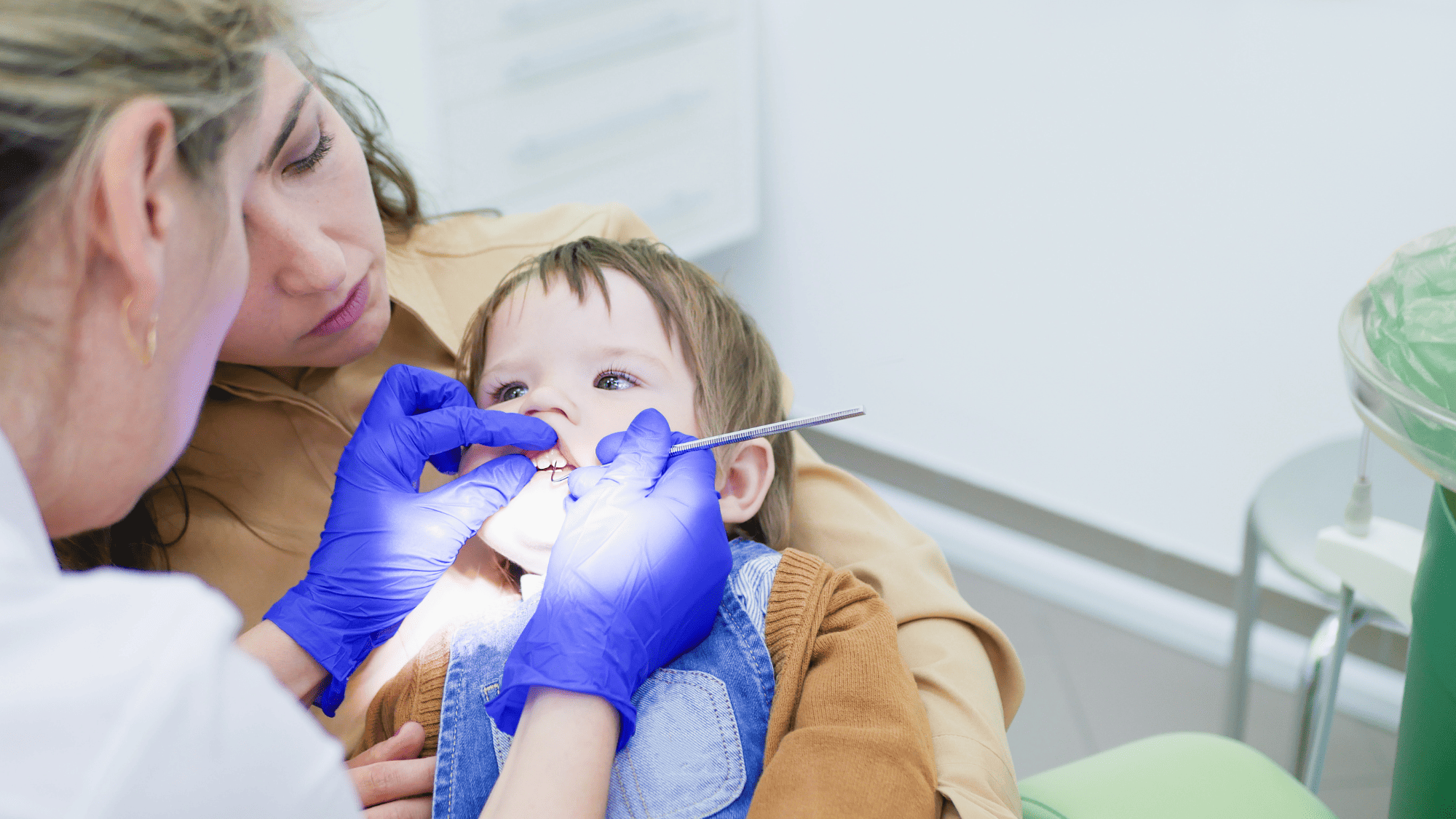
- A visit to the dentist is a great opportunity to discuss any dental health questions, such as: how to look after children’s teeth
- Parents are the best role models for their children and it’s important to be positive about visiting the dentist. Do not threaten to take children to the dentist at times of challenging behaviour as it creates a negative association
- Many dentists will have stickers and balloons to give to children at the end of the visit. Parents may want to plan a fun activity after seeing the dentist to make the whole day an enjoyable experience
- Prioritise visits to the dentist and don’t put them off! We know poor dental health can impact on general health. Children who have toothache or who need treatment may have pain, infections and difficulties with eating, sleeping and socialising.
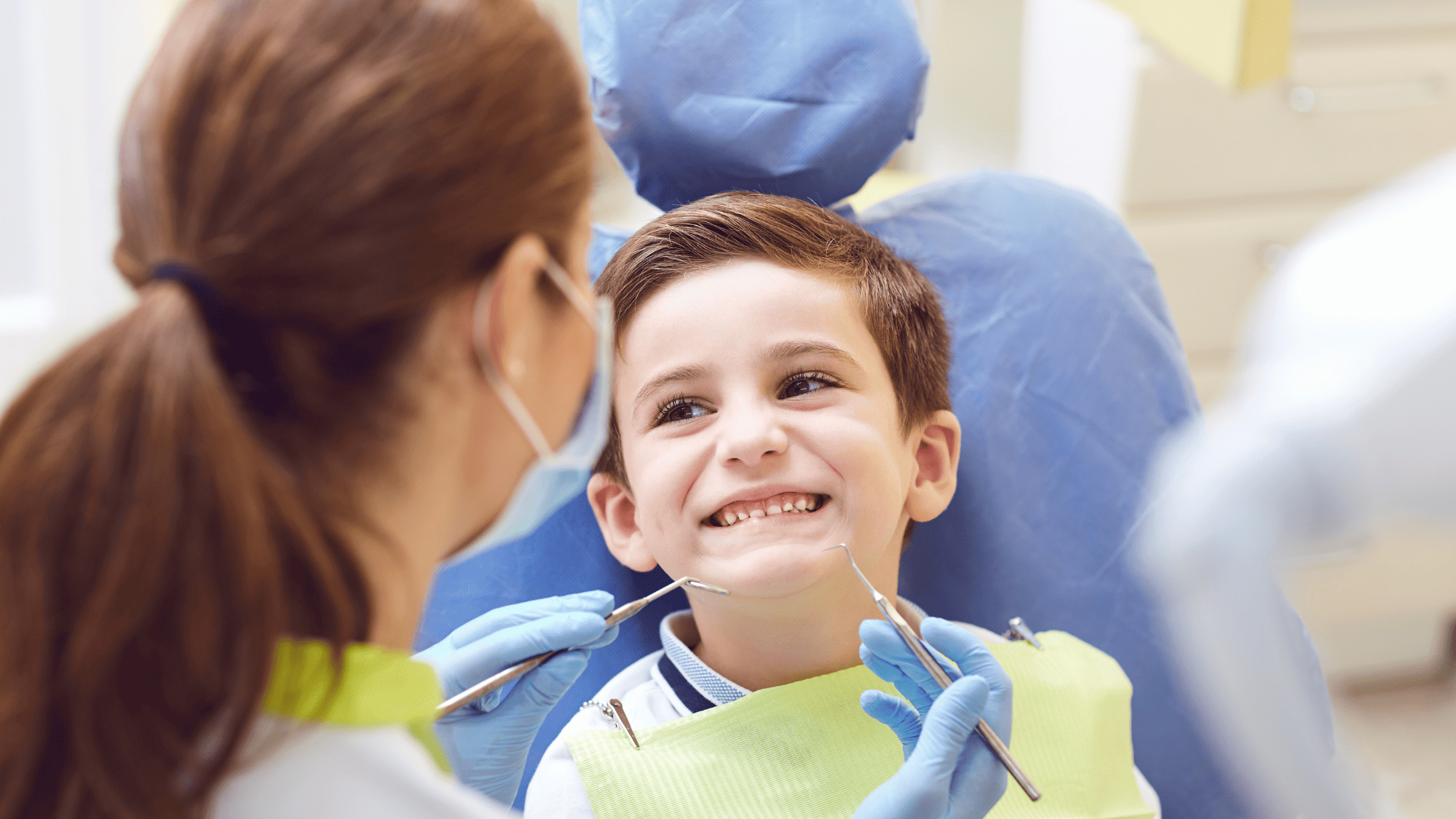
Looking after Baby and Toddler Teeth- Tips for Tooth Brushing
- Similar to us adults, children’s teeth should be brushed twice a-day, for around 2 minutes
- Their teeth should be brushed last thing at night before bed and on 1 other occasion
- For very young children with only a few teeth, it may not take a full 2 minutes to clean them. However, as more teeth appear it’s important that the time spent brushing them increases to around 2 minutes
- Use an age appropriate fluoride toothpaste (see below), and when children finish brushing their teeth they should spit and not rinse to ensure the fluoride is not washed off their teeth.
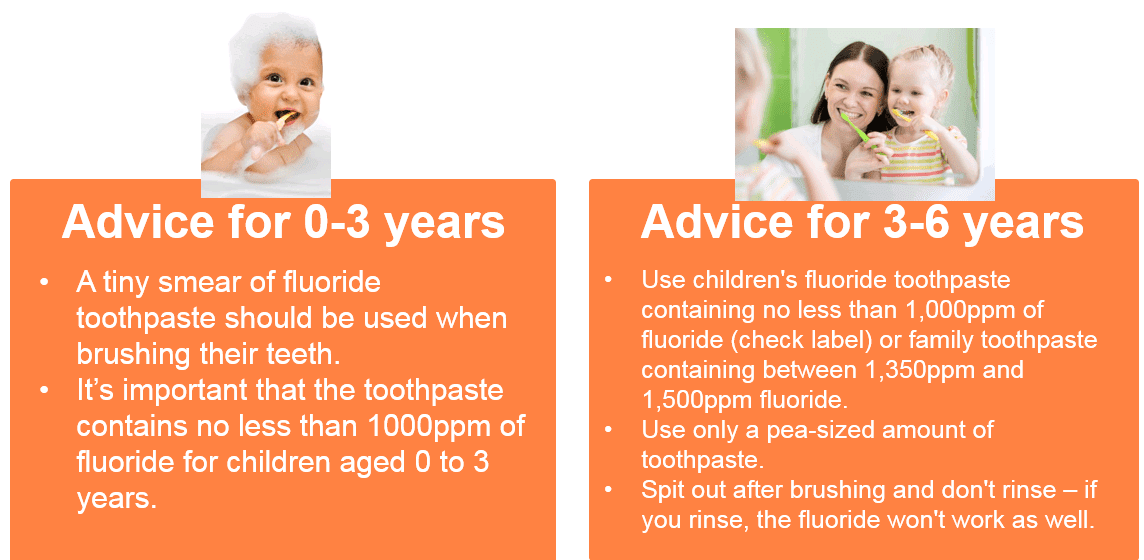
Video- Looking After Children’s Teeth
Looking after Baby and Toddler Teeth- Top tips for encouraging children to brush their teeth:
- Get children involved as much as possible so they feel they can take ownership when brushing their teeth and it will helped to make it feel less forced
- By making brushing part of the daily routine, before going to nursery or school and before bedtime, it will become a normal habit
- Start charts and stickers are a great way to make brushing teeth an enjoyable part of the daily routine.
- Younger children may enjoy brushing their teeth along to a song. TV doctor and Strictly Come Dancing star Dr Ranj is working to get UK kids brushing their teeth – strictly correctly. Check out some of his YouTube Videos here (opens in new tab)!

Looking after Baby and Toddler Teeth- Tooth friendly drinks and snacks
- Encourage your little one to to drink water and milk as these are tooth friendly drinks
- It’s best to avoid offering any fruit juices, soft drinks and fizzy drinks (even the sugar free varieties), as these can damage their teeth
- It’s important to reduce the frequency that children are offered sweets or juices so they are not part of the normal daily routine. The more often children have sugary sweets and drinks, the more often the teeth are under attack from sugars.
You can find lots more tips in our blog ‘Tooth Friendly Drinks and Snacks’ (opens in new tab).
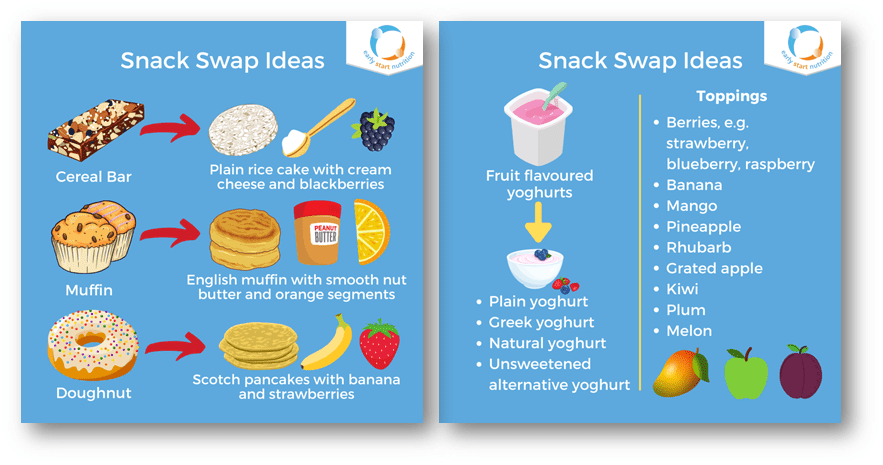
Resources
For more information on nutritious food and drink options for your little one you can find more information in the following resources :
- Good Nutrition for your Toddlers (opens in new tab) Free online parent course
- Snack Ideas for Children (opens in new tab) Blog
Looking after Baby and Toddler Teeth- FAQ’s
Q: My toddler will often suck on the toothpaste instead of spitting it out, what should I do?
A: You can get your little one to practice brushing without toothpaste. Swallowing small amounts of toothpaste is safe, but you should always encourage them to spit it out and avoid rinsing their mouth. Swallowing lots of toothpaste can effect the development of adult teeth – hence the need to only use a small amount- treat toothpaste like a medicine. For 0-3 year olds, use toothpaste with a lower concentration of fluoride (be guided by the age on the tube). Over 3’s can use a pea size amount of family toothpaste.
Q: My toddler just clamps her mouth shut when I attempt to brush her teeth making it impossible to brush. What should I do?
A: Try using a silicon finger toothbrush. Use a tiny grain of rice size amount of toothpaste. You could try brushing your teeth at the same time so your little one can copy you. Once your child finishes brushing their teeth, you can have a go too!
Q: My dentist told me I don’t have to register baby till 2 years old. Is this actually true?
A: It’s good for babies to have their first trip to the dentist when the first milk teeth erupt, so that’s any age between 4- 12 months. Call your dentist and ask to book an appointment. It will be super quick and it’s great acclimatisation for your baby.
Q: For a 9 month old, do we use toothpaste with or without fluoride and how many times should we brush their teeth?
A: You want to be using a fluoride toothpaste for 0-3yrs old twice a day. Use a grain of rice amount of toothpaste and encourage to spit toothpaste out at the end of brushing. A little goes a long way and it’s important to treat toothpaste like a medicine, so keep it out of reach of children.
Q: My little one is 14 months, he opens his mouth to brush but pushes it back out with his tongue constantly. I get it done, but until he’s old enough to understand is there anyway to get access to cleaning the bottom ones easier?
A: Try sitting your little one on your knee and resting his head against your chest, that might it easier the clean the lower teeth.
Q: Are the most expensive toothbrushes and toothpastes the best ones to buy?
When choosing a toothpaste the best thing to look out for is the level of fluoride that it contains. So for babies and toddlers it should be more than 1000ppm of fluoirde.
See the image below to find a list of reasonably priced toothpastes (sourced February 2024).
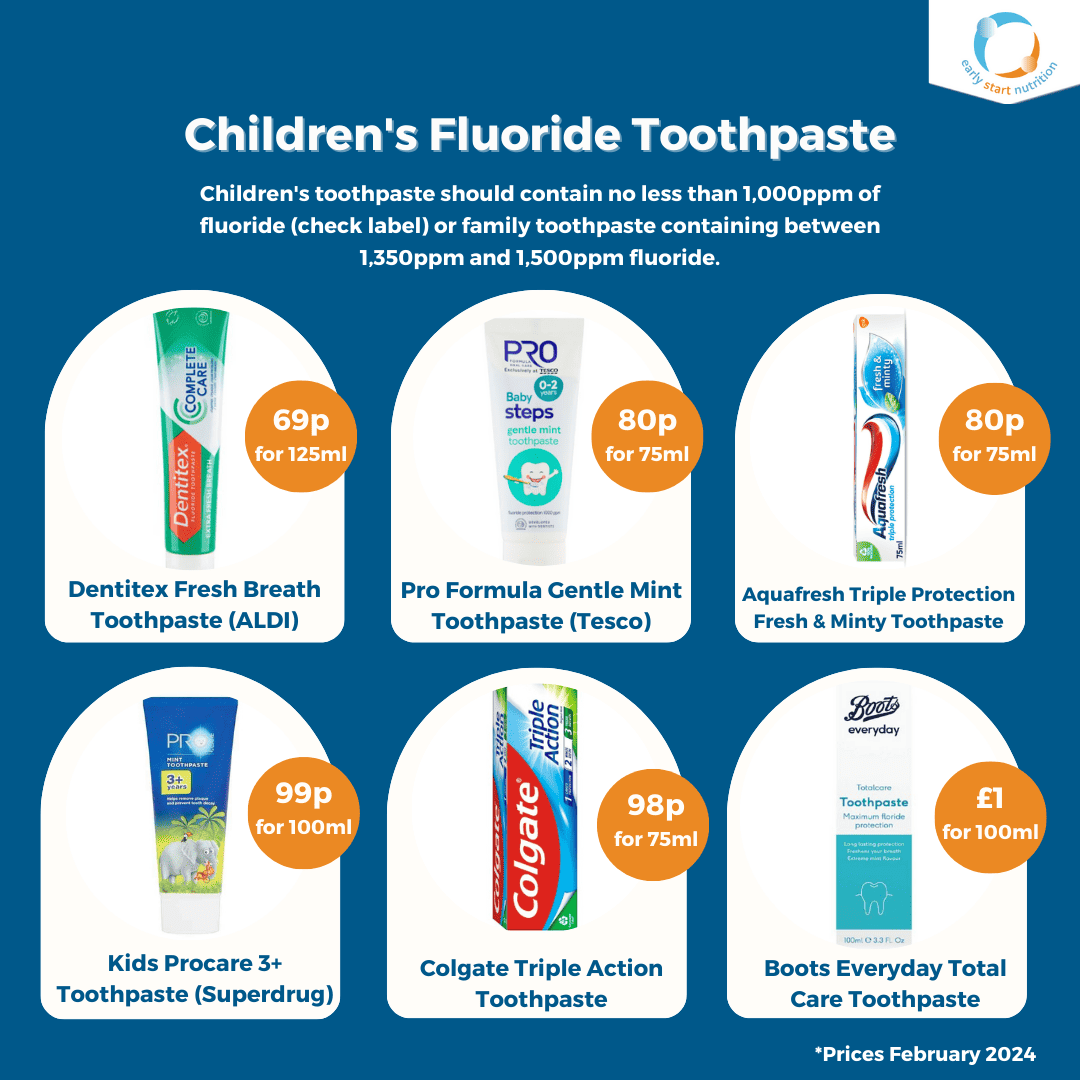
See the image below to find a list of reasonably priced toothbrushes that are suitable for children, and are not compromised on the size of bristle quality (sourced February 2024).
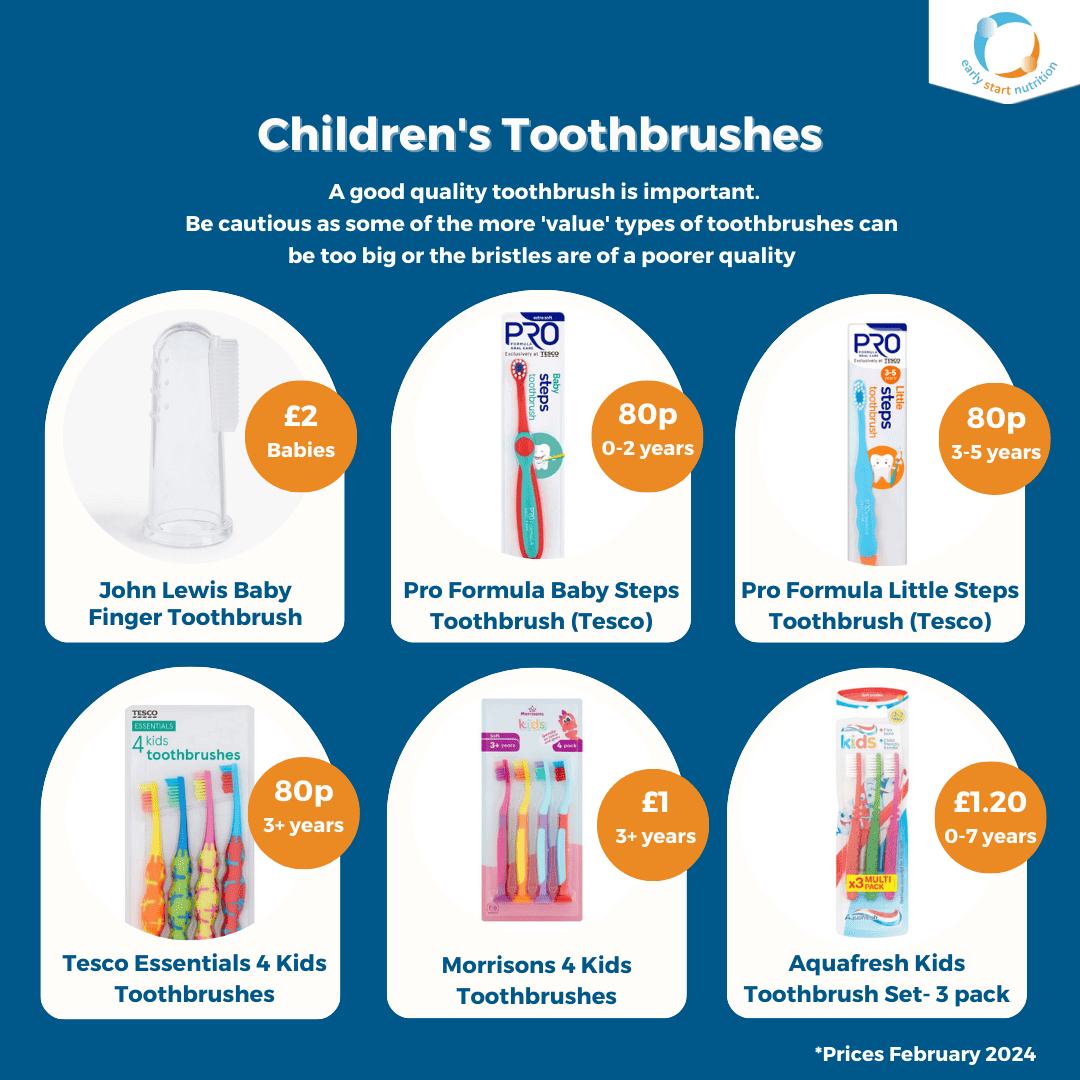
Got a question about looking after your little ones teeth? Leave a comment below and we’ll get back to you!
Training for early years practitioners
Our Oral Health Promotion online training (opens in new tab) explores the factors that can impact on children’s oral health, such as diet, tooth brushing and dental visits. Practitioners will also learn useful tips and strategies to help them support families in looking after their children’s teeth at home.
Book now for only £36! (opens in new tab) Or free for Newham Early Years Settings (contact esnutrition@earlystartgroup.com for your FREE coupon code)

By using a tiny smear of toothpaste for babies and toddlers up to 3 years old, and a pea-sized amount for children aged 3 to 6 years. Gradually start brushing your child’s teeth more thoroughly, covering all the surfaces of the teeth.